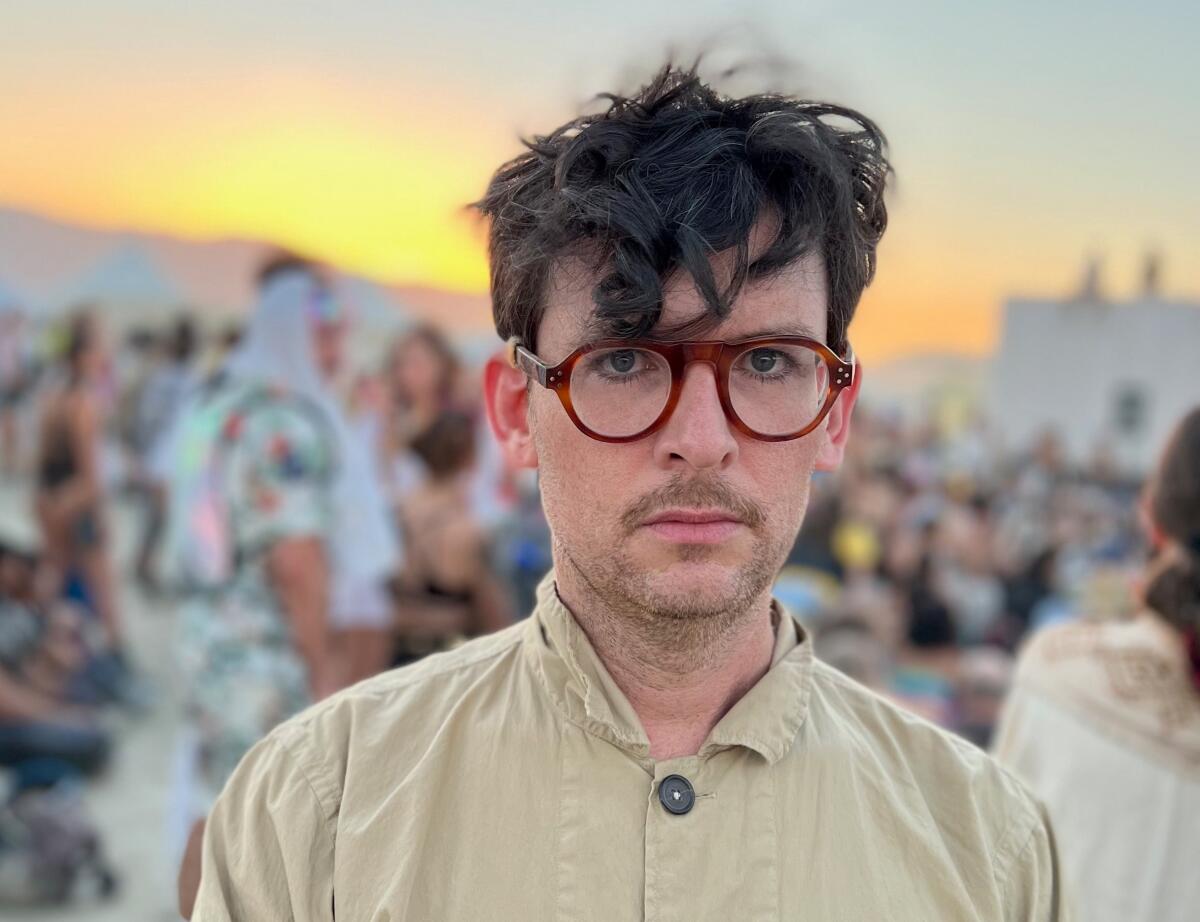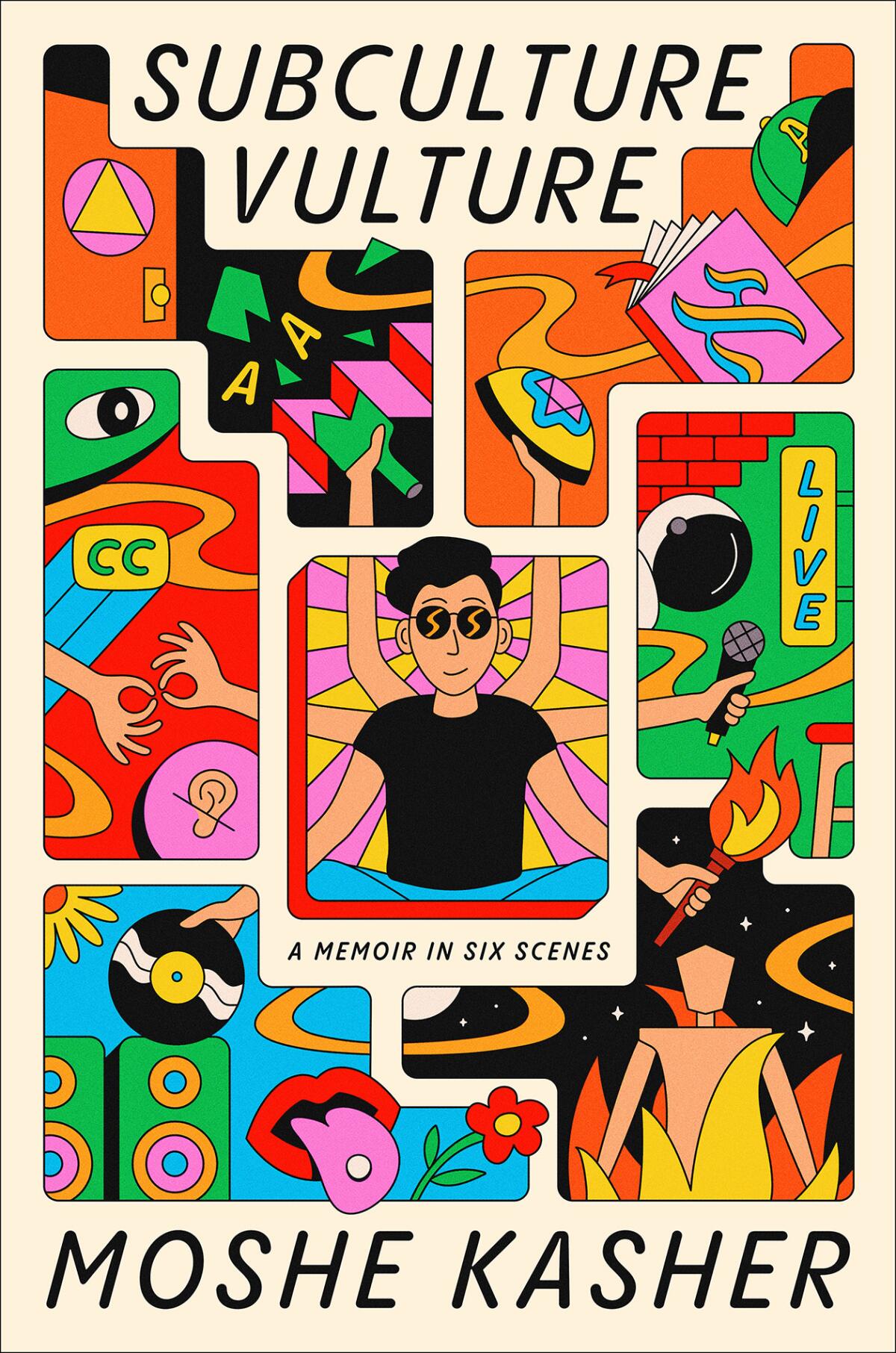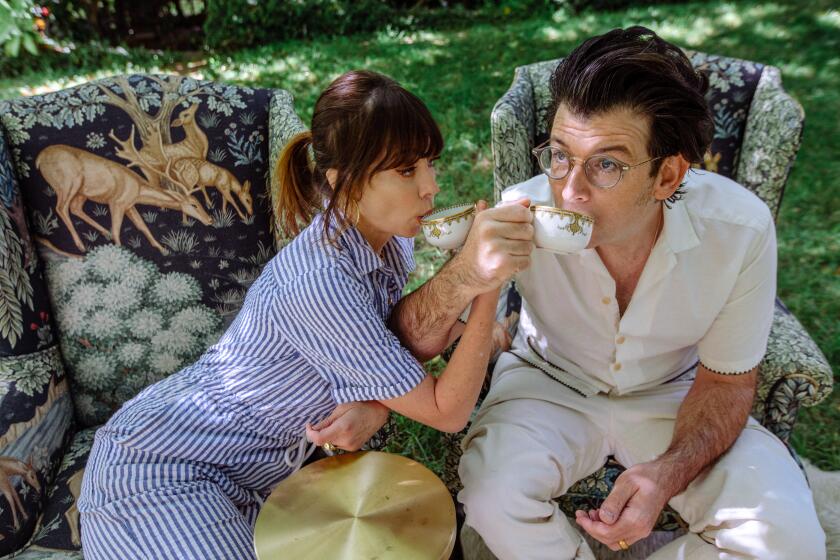Moshe Kasher writes his Book of Revelations in the experience-packed ‘Subculture Vulture’

- Share via
Moshe Kasher is sitting in a tiny kitchen on the second floor of St. Paul’s Commons. Twice a month, the building, technically the oldest Episcopal Church in Los Angeles, is home to Nefesh, a spiritual, transdenominational Jewish community based in Echo Park.
Though Friday night services are set to begin at 7 p.m., we need a quiet place to discuss the stand-up comedian and podcaster’s second book, “Subculture Vulture: A Memoir in Six Scenes,” an endlessly clever volume chronicling Kasher’s time as a “boy-king” of Alcoholics Anonymous, a rave promoter/DJ/sober ecstasy dealer, a Burning Man security guard, sign language interpreter, stand-up comedian, and member of a Satmar Hasidic Jewish community.
For our conversation, the church-synagogue’s kitchen will have to do for now.
As Nefesh volunteers scurry in and out, Kasher apologizes for the temporary intrusion. Around us are culturally clashing foods — boxes of takeout Indian dishes set across the room from a cart of sliced challah and tiny cups of prayer wine. The divergent aromas are a convenient metaphor for “Subculture Vulture,” which outlines many lives coexisting within one person.
Even Kasher’s Jewish upbringing was an exercise in extremes: Born in Queens in 1979 to deaf parents who separated when he was nine months old, Kasher would spend most of the calendar year living a nonreligious life with his mother in Oakland. However, once summer rolled around, he and his older brother would travel to Seagate, Brooklyn, where they’d switch their jeans for plain black slacks and adopt a (temporary) ultra-Orthodox lifestyle with their father and stepsiblings.
“I had simultaneously a more Jewish and much less Jewish upbringing than any of my Jewish friends,” says Kasher, who currently lives on Los Angeles’ East Side with his wife, fellow comedian Natasha Leggero, and their daughter. “I didn’t go to summer camp; I didn’t really have much of a Jewish identity year-round.
“People don’t understand the depths that I was in,” Kasher adds about time spent in the Hasidic community. “Also, I don’t understand the depths that can come from a year-round Jewish experience. I was a fully secular kid nine months out of the year, and then I would fly [to Brooklyn] and become this extra on the set of ‘Fiddler On The Roof.’”
Though it might sound potentially traumatic for a secular child to spend three months out of the year ensconced in a populace where married women shave their heads and services are routinely separated by gender, Kasher says he came out of the experience unscarred. “Yes, it was not a great summer vacation,” he admits. “But it was so temporary. It was like I could [be] an insider anthropologist: go in and experience it and get out and get back to my real life.”
As an adult, Kasher describes Judaism as “a loose garment” and Nefesh as “a place that represents my aesthetic.” It’s easy to see why Nefesh appeals to Kasher: it places a special focus on interfaith outreach (Leggero converted when she and Kasher got married in 2015; interfaith relations remain controversial in many traditional Jewish settings). Nefesh also has a trans, queer rabbinic intern (Sasha Perry), a female head rabbi (Susan Goldberg, whom Kasher calls “a dynamo”), and vibrant musical presence, with each service being accompanied by themed original songs, overseen by co-directors Duvid Swirsky (Kasher’s first cousin, coincidentally) and Sally Dworsky.

Because we are seated in a church-turned-synagogue (for the night) and engulfed in a discussion around Judaism and contemporary antisemitism, it must be asked: How is Kasher feeling as Jews the world over, particularly in the West, are at odds over how to respond to the events of October 7 and resulting Israel-Hamas war? “Do you ever feel like you’re spiritually oatmeal?” replies Kasher. (Answering a question with a question. How on brand.) “I feel like this middle-of-the-road, not-that-spicy moderate.”
Kasher continues, recounting how immediately after October 7, he attended a memorial event organized by his brother, who is now a rabbi. “I realized on October 7, and in the aftermath, [that] I experience things historically. That’s how I process,” he says. “This event that my brother [organized] was extremely emotional. People were weeping, and I was weeping. I was staring at this man, who was crying in the front row, and I start to see another version of — or an echo of — this man, 500 years ago, in a similar room, in a similar crisis, huddled together with the Jewish community in a time of great fear. I see this kind of fear echo throughout a 2000-year history.”
Holding a degree in religious studies from UCSB, Kasher has also grappled with the war by doing a historical deep dive. The result? He’s still oatmeal. “I bought two books: Daniel Gordis’ ‘Israel: A Concise History Of A Nation Reborn’ and Rashid Khalidi’s ‘Hundred Years’ War on Palestine.’ That was the plan: I’m going to read a history book from an Israeli perspective, hopefully not too insanely biased. I’m going to read a history book from a Palestinian perspective, hopefully not too insanely biased. I have issues with both [sides],” Kasher muses.
“I have this deep envy of my friends right now,” Kasher adds. “Algorithmically, I’m in the middle. I can feel Instagram doing it to me. I get sent [videos that portray] Israel as pure heroics and videos [portraying] Palestinians are pure martyrs in equal measure. I’m so envious of my friends who know who the bad guy is for sure. [But] I don’t think that figuring out who the bad guy is does anything for anybody. I don’t think it lends itself to getting closer to an answer. I think it lends itself to having comfort in a time where it is so unclear what to do ... I just feel really heartbroken and hopeless. About Israel and Palestine and all this endless violence.”
While “Subculture Vulture” is heavily in conversation with Kasher’s unconventional Jewish upbringing, it contains five other sections that could easily merit their own individual memoirs. Picking up where 2012’s “Kasher in the Rye: The True Tale of a White Boy from Oakland Who Became a Drug Addict, Criminal, Mental Patient, and Then Turned 16” left off, “Subculture Vulture” weaves academic research with poignant personal narrative, both of which come overlaid with the author’s bantering commentary. Across nearly 300 pages, Kasher recounts his time as a “pubescent proselytizer” in AA, a San Francisco DJ and raver, a Burning Man security guard (yes, he got stuck in the mud last year, but “everybody loved it”), sign language interpreter, and, with some inspiration from Bay Area hometown hero Chelsea Peretti, comedy-club regular.
Today, Kasher is best known for his audience-heckling stand-up prowess, high-profile TV spots on shows such as “The Good Place” and “Shameless,” and multiple Netflix specials: 2012’s “Moshe Kasher: Live In Oakland” and a 2018 joint special with Leggero “The Honeymoon Stand Up Special,” which later led to the couple hosting a spinoff relationship advice podcast called “The Endless Honeymoon.”
There were inevitably times where these subcultures overlapped; present-day Kasher no longer attends AA meetings (leaving, he says, was “like being a church elder and having a slow realization that you don’t know if you’re a believer anymore”) or raves. Comedy, on the other hand, largely takes up his day-to-day and acts as a vehicle to unfurl and endless array of stories about growing up with deaf parents, opposite extremes of Judaism, and attending Burning Man, where, again, the real Burners (as opposed to “weak people cosplaying as survivalists”) were thrilled about last year’s mud.
“I know that that’s going to be painful to your readers,” Kasher quips about Black Rock City’s post-rainstorm “moop.” “I could sense a global schadenfreude about watching Burning Man attendees suffer, but nobody was suffering. The only people that were suffering were people there for their first year.”
If there is one unifying theme across all six subcultures, it is that everything changes, whether it is the scene itself, or you. Across two or so decades, Kasher has even had to find new ways to exist within comedy and the entertainment industry.
“Comedy has this 15-year unpaid internship,” Kasher says. “So, getting paid at the end is the prize. When you’re not getting paid, it’s so much more vital and so much more exciting, striving. Once you get on the other side of the line, then you start to see the ugly part of the of the business and it becomes a different thing … [But] I can’t leave comedy. I don’t want to leave comedy. It’s all I’ve done for 20 years, I pay my mortgage doing this, I feed my daughter doing this. So, you’re forced to find things in it that you still love. I think that’s why I [structured the book with] comedy, history, and resources, because this is something different. This feels meaningful.”
That this many unrelated lifestyles can exist in one person makes for supremely entertaining reading. It’s also clear that Kasher, an avid scholar with subjects that catch his interest, has used writing “Subculture Vulture” as a vehicle to learn about the adult he is today and leave a cultural time capsule for his 5-year-old daughter, who, he hopes, will “find her people” amid an internet-flattened monoculture.
“I learned how much I like people on the on the margins of the world, and people that fight for their existence and people that are weird,” Kasher says of writing “Subculture Vulture.” “I also realized how much — and I think this is true for everybody — how much these experiences have resulted in me.
“For people reading it, I hope people learn a lot about things they didn’t know about,” Kasher continues. “And for people that did know a lot about these worlds, I hope they have a good time reading a much more irreverent history of a world that they know … If you know about this stuff, you won’t be shocked by some of the revelations. But I hope you’ll be entertained by it.
“I guess what I really realized is, destiny exists in the rearview mirror. Destiny exists looking backwards,” Kasher said. “I was always going here, for better or for worse. These are love letters to things that I love. And I hope that people see what I saw in them. And I hope that they that they love them too.”
More to Read
The biggest entertainment stories
Get our big stories about Hollywood, film, television, music, arts, culture and more right in your inbox as soon as they publish.
You may occasionally receive promotional content from the Los Angeles Times.












